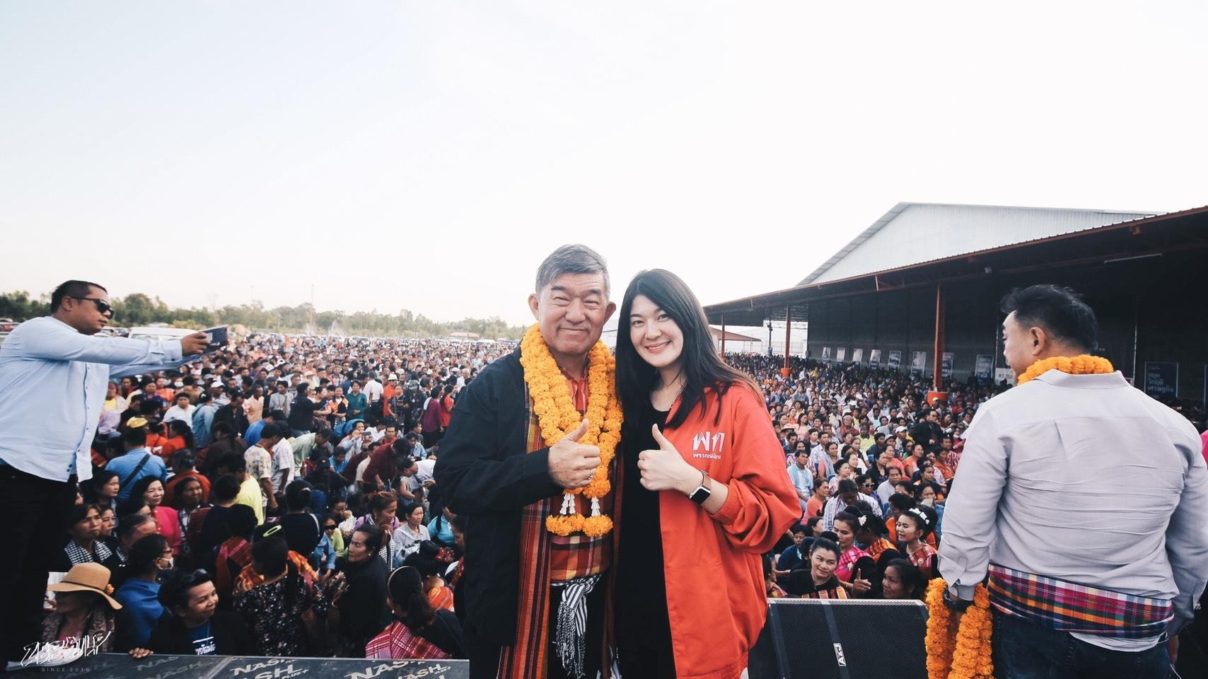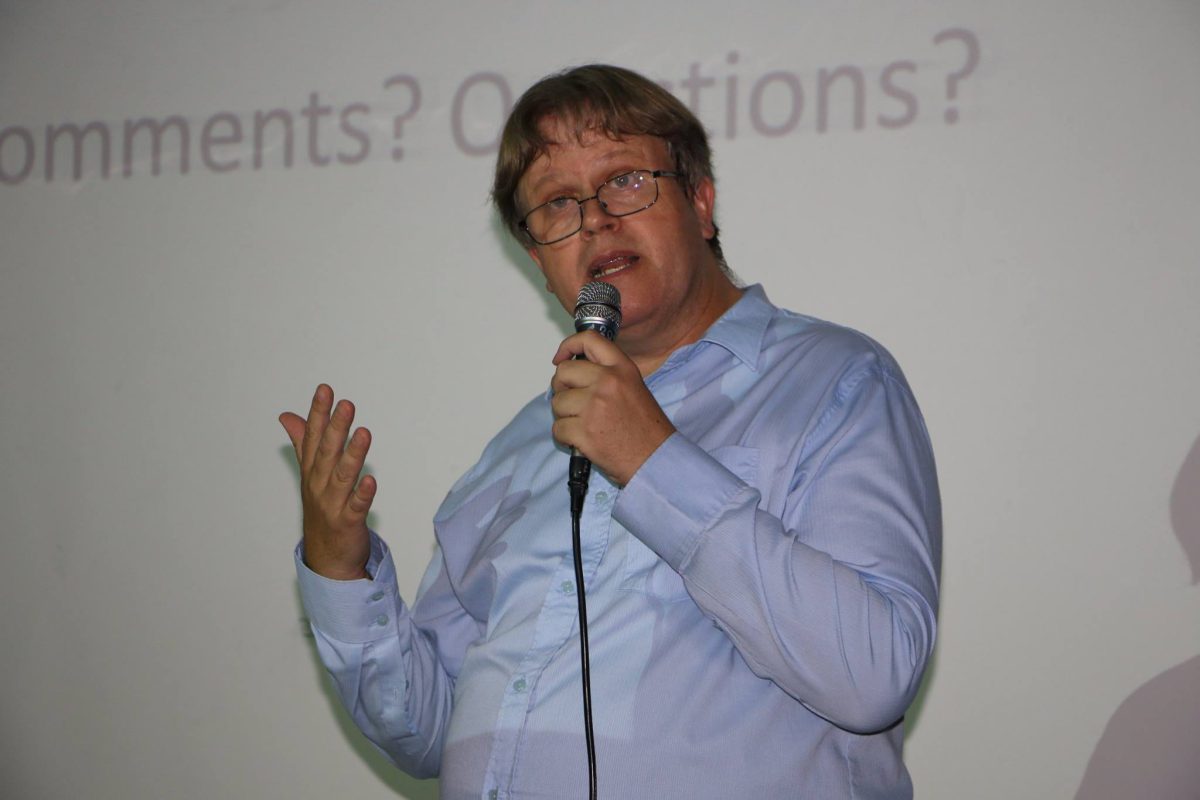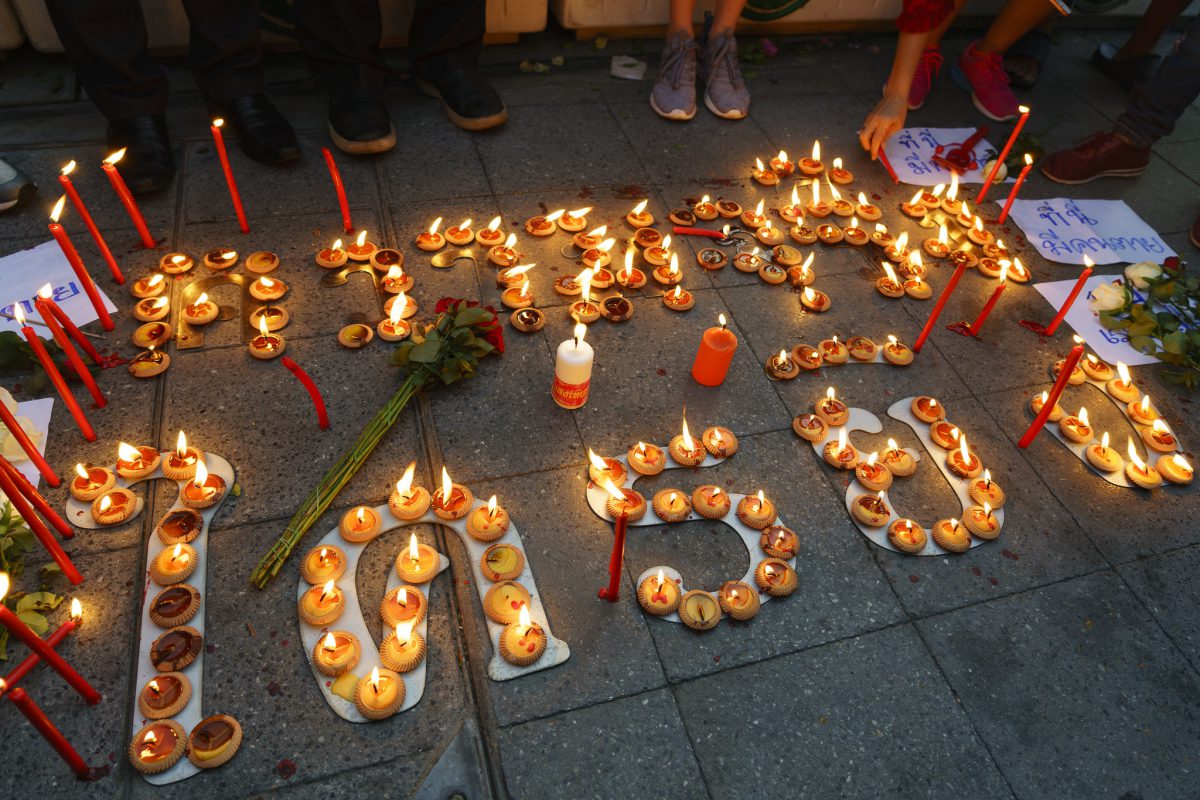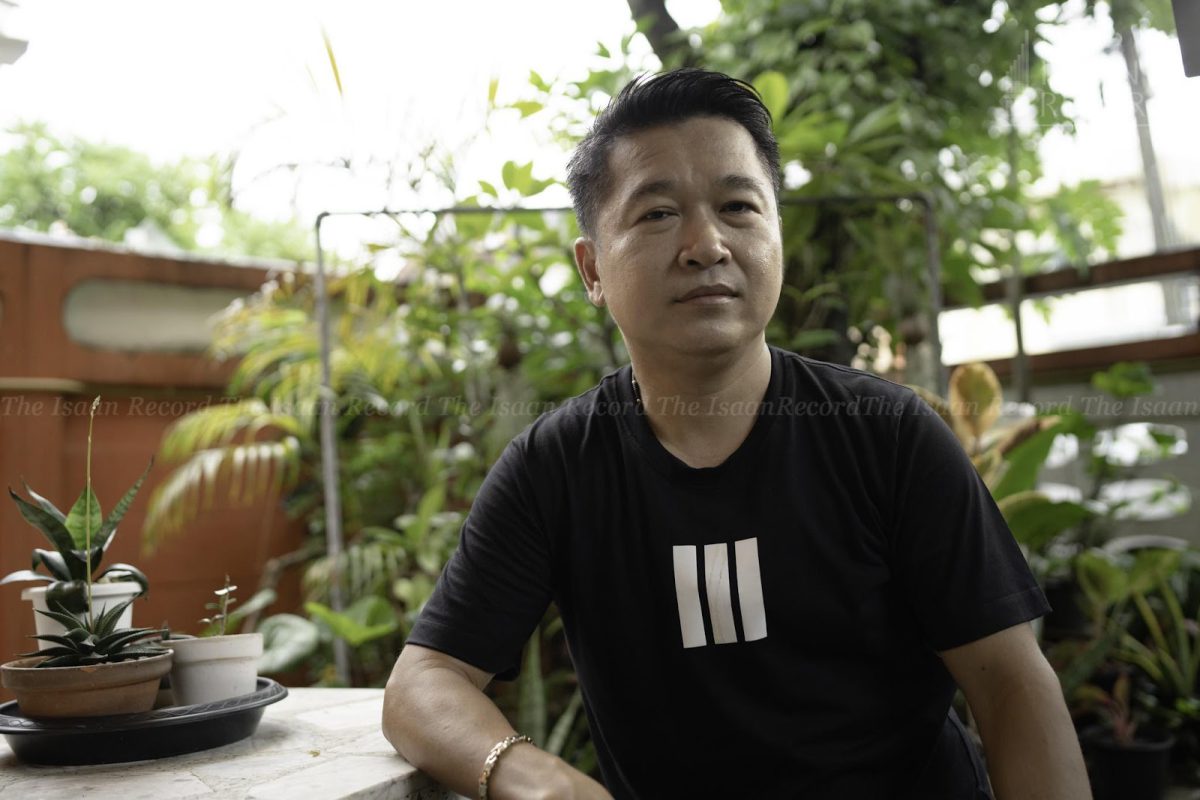
Interview by Atithep Chanthet
Ahead of Thailand’s controversial national election on March 24, a young woman was frequently seen on the stage of Pheu Thai Party rallies in Ubon Ratchathani or eagerly handing out election pamphlets to voters in the provincial capital.
Born into a family of politicians, Sudarat “Kran” Phithakphonphanlop has been following her father, Chuwit Phithakphonphanlop, a well-known Pheu Thai candidate for Ubon Ratchathani’s District 7, on the campaign trail since a young age. Her mother was an elected member of the Provincial Administrative Organization.
What is it like to grow up in a family of politicians in Isaan? What is it like to come of age in a time when the military has an iron grip on the country’s politics and democracy only seems an empty promise?
In this interview for The Isaan Record, the 23-year-old political science graduate talks about her upbringing as the child of one of the most influential political families in the province. She shares her views on the erratic nature of Thai politics, her hopes for democracy, and her own political ambitions.
Atithep Chanthet (AC): Back when you were a child, how was it like growing up?
Sudarat Phithakphonphanlop (SP): First of all, I have to tell you that I grew up in a family of politicians. My father has been a member of parliament since I can remember. My mother was a member of the Provincial Administrative Organization and worked to serve the locals in Trakan Pheut Phon district [in the northern part of Ubon Ratchathani province].
Since I was a child, I’ve been visiting communities with my family. I saw all the problems in these areas. My father, in my eyes, is quite a down-to-earth man, and he’s helped a lot of people. The villagers would always come to see him seeking for advice. Almost every day, someone would come to our house. The people always come first, rather than the family (laughs).
My dad has this one slogan he always saying: “I will make big issues small, and make small ones disappear.” So, I’ve been seeing my dad working as a politician since I was little, and I’ve always been seeing this kind of atmosphere.
AC: What was it like to go on the campaign trail with your dad?
SP: When I was little, my dad would bring me up on the stage. I don’t remember how old I was back then, but judging from the photos, I was very young.
Now that I’m older, when I join my dad during a rally, people would ask me if I was the one who went up on stage and said [in Isaan dialect], “Please vote for my dad. He wants to be an MP very much.” The villagers actually remembered me (laughing).
When we visited communities, I saw many of the problems the villagers were facing, including livelihood issues, low agricultural product prices, access to public health services.
But of course, I couldn’t help much on my part. I could only listen to them and gather information to help solve these problems in the future. That’s because all of these issues belong to the state. The state needs to assist people to create equality among people.
AC: How do you think people perceive you?
SP: People who know me might think that I’m just a privileged girl, that I’m very lucky, someone who has everything. But in reality I know myself that I’m not perfect. I’m just trying to always improve my capabilities and knowledge in the modern world as much as I can.
AC: Do you feel pressured sometimes?
SP: As a daughter of two politicians, I do feel pressured because I have to be with the people. People look at me as the child of politicians. Before I do anything, I have to think a lot. I have to make careful decisions because whatever I do as it might have some effect on my parents. But I do understand my own role and I feel I can always be myself.
AC: Tell us about when you ran for student union president at your university.
SP: I remember when I made the decision to run for president of thePolitical Science Faculty student union, I was not confident. I didn’t have faith in myself. Also, I wasn’t very involved in university activities.
On election day, it turned out that my party won over a long-time winning party. It was a changing point that made me improve myself in many ways, especially in terms of leadership, management, and policy skills. And maybe because I’m from a political family, I kind of knew the approach for quick self-development and that I could instill trust from the students.
It turned out to change my attitude and life. Also, as a child of politicians, it seemed my life path should probably follow the family line.

Sudarat discovered her own potential for politics during her candidacy for president of the Political Science Faculty student union at Ubon Ratchathani University in 2017 and 2018. Photo: Chuwit Kui Phithakphallop
AC: How did you manage to win as a first-time candidate?
SP: Maybe because I’m the daughter of politicians, I have a different understanding, attitude, or strategies for campaigning than others. I used Facebook to message my classmates and other students, and I invited them to come out and vote. I used Facebook as a tool to canvass votes.
My dad always told me that visiting every household in a community is meaningful to our work. And I am the kind of person who’s not hesitant to approach people. So it’s like I applied my life experiences working with my father to my campaign, and it actually worked.
AC: When did you start to get really interested in politics?
It was after the coup d’etat in 2014. I was studying in the US then. My dad and I had made a plan for a visit to New York together. He was supposed to pick me up in late May and we were going to travel together before my moving back to Thailand. But on the evening of May 22, the National Council for Peace and Order [NCPO] seized power and banned politicians from leaving the country without permission. So, my dream of travelling to New York with my dad was destroyed.
After the coup, my friends and people I knew in the US were all very interested and wanted to know why such a thing continued to happen in Thailand. After that, I started to study in depth about Thai politics.
AC: How was your life and that of your family after the coup?
SP: Of course, each time a coup happened, it affected my family because they were politicians. Who got into the most trouble was my dad. On the day the NCPO took power, my dad told me he’d been in an urgent meeting at parliament. That evening, the MPs had to run out from the parliament building [to escape]. My dad climbed a fence opposite from Khao Din Zoo. He took a tuk-tuk to Don Mueang Airport as fast as he could. He made it out before the army was able to arrest the MPs who were still in parliament.
After my dad landed in Ubon Ratchathani, he grabbed some clothes and other necessary items and stayed in another house, a safe house. Back then, I didn’t understand why my dad had to go into hiding. I could only listen to what was happening. I didn’t experience it myself because I was still abroad at the time. I could only call my mom and my sister to find out what was happening.
AC: What did they tell you about the situation back home?
SP: She said about ten tanks were parked outside our house. The soldiers then went inside and searched everything. My sister was home alone at the time. The soldiers wore boots inside the house and opened my sister’s bedroom demanding to know where our father went. She said she had no idea.
Personally, I don’t understand why they dared come inside our house, invading our privacy. After that, soldiers were stationed outside our house to keep watch.
AC: Despite your family’s experience after the coup, you chose to do an internship with the military regime’s National Legislative Assembly of Thailand [NLA]. They were drafting the 2017 Constitution at the time. What was your experience like?
SP: I got the opportunity to assist someone [the Chairman of the Constitution Drafting Committee] as old as my grandfather . I thought that these people were the ones who were determining our country’s future. [But] these people were not elected by anyone to do this job.
Everyday I had to sit and listen to them deciding the future of our country, a future that my generation would have to live in. These people probably won’t even know the outcome of their decisions.
The internship was an unhappy one. I can’t even put it into words.

During the last election in March, Sudarat helped her father campaign. Photo: Chuwit Kui Phithakphallop
AC: Have you ever considered following the footsteps of our mother and father?
SP: It’s something that might lie in the future. If I could really become an MP, I would want to have achieved it by myself, not because I am the daughter of a politician. I don’t want to be compared with my father and his achievements. I don’t want people to choose me because they think I’m my father’s daughter. I’d rather want them to vote for me because I was qualified to be a people’s representative, to work for the people.
For now, my plan is to focus on continuing my education abroad because we have to keep learning, both in school and in society.
AC: When your father’s working in parliament, what are you doing?
SP: Currently, I work at our farm. I am a farm woman raising cows. Our family has a cow and tiger farm.
When villagers invite my dad to join any local cultural events, I sometimes go on his behalf. We have his work schedule at home. On any day when he has to be in parliament, I will represent him in these activities. When people see me there, they will know automatically that I’m there on his behalf.

Sudarat’s family runs a cow and tiger farm called “Chuwit Farm.” Photo: Chuwit Kui Phithakphallop
AC: Let’s go back to talk about democracy, What does it mean to you? How democratic is Thailand after the election on March 24?
The democratic principle that many countries around the world use is “of the people, by the people, for the people.” But at the moment this is not the case [in Thailand].
Some groups have created a discourse about democracy that makes people understand it in a wrong way. Democracy should be based on public consensus but some groups are promoting a distorted version of democracy.
Let me give you an example. Since the election, they [the government] can claim that they are democratic because they were voted in. But where did this democracy come from when it was they wrote all the rules themselves, when they had 250 [senators] on their side, and the power of Article 44 [of the interim constitution which gave the military junta absolute power]. What kind of democracy is this?
I’m not sure if we will be alive on that day when democracy is really established here. Right now, the dictatorship is trying to distort our democracy.

Sudarat said that she was born and raised in a political family. During her childhood, she often visited communities with her politician parents. Photo: Chuwit Kui Phithakphallop
AC: Do you think younger people can take a significant role in this country? In what ways do you want to see the new generation contribute?
SP: The new generation is very important for our country because society is developing fast and is becoming ever more complicated. Those who will be able to keep track and address the needs of society are inevitably the new generation with new ideas to develop the country.
The new generation wants to determine the country’s future. Actually, this is our time and we shouldn’t let anyone else define our future.
AC: How do see Thailand’s future?
SP: I can’t really predict anything. Thailand’s politics is something beyond any predictions. We have to wait until it’s time for our generation to step in and fix these problems. All we can do is to make ourselves useful, for ourselves, for our fellow human beings, and the country.
In the end, nothing is permanent and nothing is certain. We can only do our best and try not to feel sad for what’s happened in the past. We only have to keep fighting. I’d give my support to everyone, no matter what you are struggling against, to remember that everything shall pass.
This story was first published in Thai on 5 July 2019. Translation and editing by The Isaan Record.




